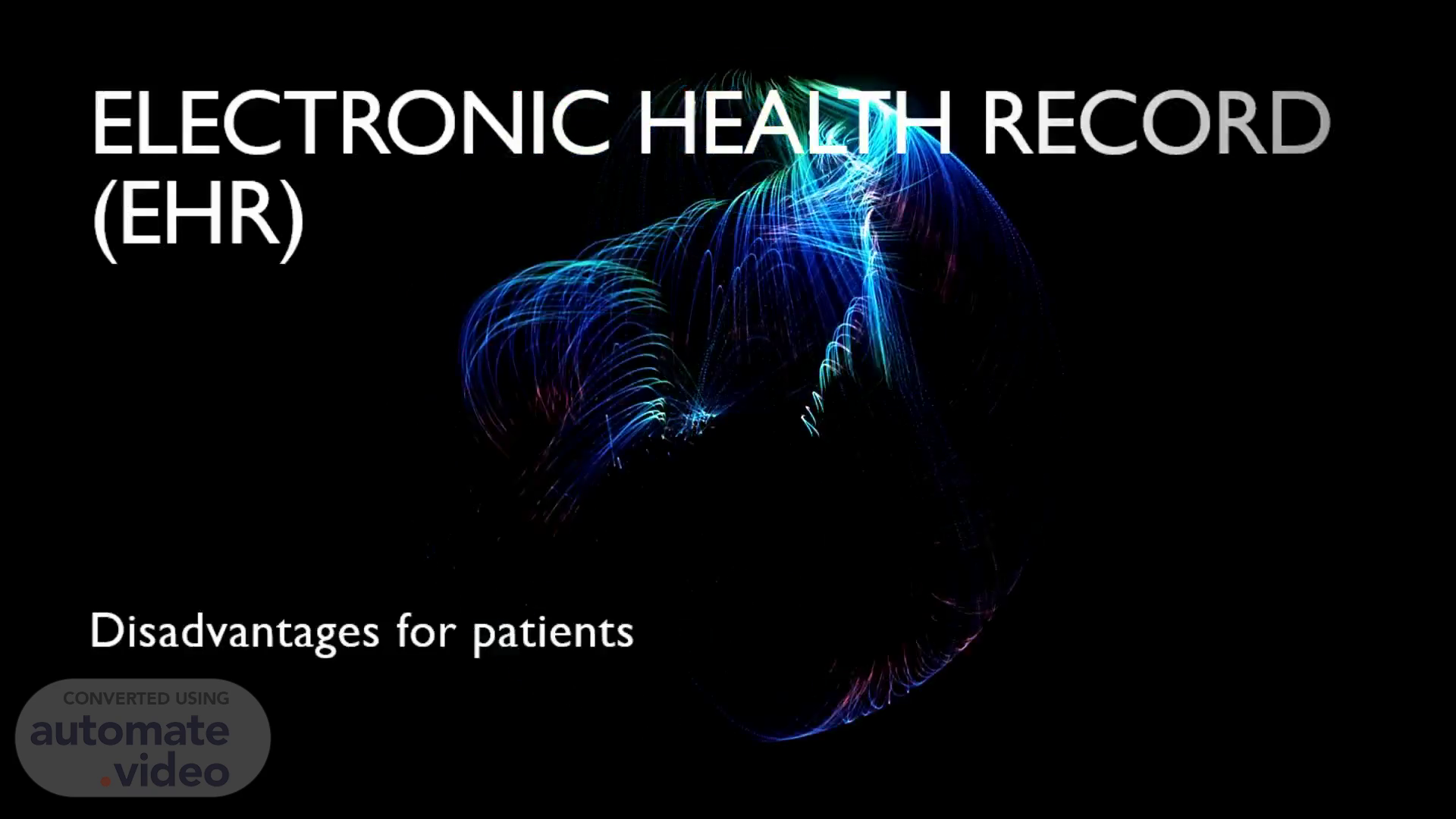
Page 1 (0s)
Electronic health record (EHR). Disadvantages for patients.
Page 2 (7s)
Electronic health record (EHR). Objectives: -Discuss electronic health record system -Define benefits and disadvantages of EHR use -Explain some legal concerns and policy changes.
Page 3 (18s)
Electronic health record (EHR). Informatic is very integrated in every organization in the world According to the center for Medicare and Medicaid Services (CMS): Electronic Health Record (EHR) is an electronic version of a patient’s medical history It is maintained by the provider over time It may include all the key administrative clinical data relevant to that person’s care under a particular provider May also include demographics, progress notes, problems, medications, vital signs And past medical history, immunizations, laboratory data and radiology reports.
Page 4 (43s)
Electronic health record (EHR). EHR sets access to information Has the ability to support other care-related activities directly or indirectly Supports care through various interface such as evidence-based decision support quality management outcomes reporting..
Page 5 (56s)
Electronic health record (EHR). Benefits with the utilization of EHR: Providers and other authorized users are able to easily access informatics records Not having to try to decipher a hand-written medical record Eliminates misinterpretation and potential errors of any ineligible handwriting Reducing costs for the providers Assisting in better decisions making Having better data entry system Better information exchange system.
Page 6 (1m 15s)
Electronic health record (EHR). Capabilities and functionalities are based on “meaningful use” evaluation Clinical outcomes Organizational outcomes Societal outcomes. A study reveals Certain EHR have a potential reduction from 55% to 86% in serious medication errors in the hospital setting Computerization decrease error rate by 10%..
Page 7 (1m 30s)
Electronic health record (EHR). Disadvantages: Some studies found that some EHRS increase medical errors due to poorly designed system interfaces and poor consumer training. Financial issues: adoption and implementation costs, ongoing maintenance costs, replacement of hardware, upgrading routinely, Frequent audit function required by law ongoing training on upgrades and new staff. Less productive during training.
Page 8 (1m 50s)
Electronic health record (EHR). Disadvantages (cont’d): Privacy and security system: Potential Patient privacy violations due to constant health exchange. Study published in Journal of Medical System reveals: Security and privacy of EHR at risk due to rise of advanced cyber threats Despite government laws to safeguard and protect patient, cyberattack remains a concern.
Page 9 (2m 7s)
Electronic health record (EHR). Disadvantages for patients (cont’d): Study shows: Increase in security risks from 2009 to 2021 Total of 4,419 healthcare data breaches affecting 314,063,186 healthcare records Data breaches resulted in loss, theft, exposure And impermissible disclosure of patient’s information Among these reported breaches, Aetna was one of the reported breaches In 2015, 78,800,000 clients were affected (Snell, 2017)..
Page 10 (2m 29s)
Electronic health record (EHR). Disadvantages for patients (cont’d) One size fits all, inability to document patient-specific symptoms or concerns Certain EHRs may block physician from ordering necessary tests Tests ordered based on list of symptoms options in EHR Unintended consequences, provider spending more time clicking on computers Unexpected loss of power or internet causing patient’s data not available Hackers using patient’s personal information for criminal acts Cybercrime perpetrator constantly upgrading their attacks techniques Data entered in error is difficult to be removed from patient’s electronic chart.
Page 11 (2m 53s)
Electronic health record (EHR). Disadvantages for patients (cont’d): According to the department of Human Health Services (HHS) Treats to EHRS systems include Phishing attacts Malware and Ransomware Cloud threats Insufficient Encryption Employee/Insider threat.
Page 12 (3m 6s)
Electronic health record (EHR). Research: Study of benefits and drawbacks of electronic health record systems by Menachemi & al. (2011) Study of security techniques for the electronic health records by Kruse & al. (2017) There is evidence-based positive and negative impacts of EHRS to patients Despite many drawbacks for patients, EHRS remain a necessary tool for the advancement of healthcare.
Page 13 (3m 25s)
Electronic health record (EHR). Ethical and legal issues: Patients’ data being exchanged without their knowledge Cost of healthcare has not decrease Access to healthcare not available to all Violation of privacy and confidentiality Possibility of medical errors Vulnerable to fraud claims Lawsuits due breach of unauthorized user.
Page 14 (3m 41s)
Electronic health record (EHR). Important legislations are in place by the US government. Health Insurance Portability and Accountability Act (HIPAA) (1996) Patient Protection and Affordable Care Act (PPACA) (2010) Health information technology for economic and clinical health act (HITECH) (2009 Trained technology security officers to reinforce cyber rule.
Page 15 (3m 57s)
Electronic health record (EHR). No changes recommended Many laws and policies exist for the implementation of secured and safe plan to protect patients Both organizations and government recognize the risk of security violation Continue to identify potential treats and address them There is constant need for training and education to empower end-users Success is evaluated based on the number of reported data breaches Based also on the satisfaction of consumer and patient.
Page 16 (4m 18s)
Electronic health record (EHR). References Menachemi , N. & al., (2011) Benefits and drawbacks of electronic health record systems National Library of Medicine. Doi:10.2147/RMHP.S12985 Kruse, C. & al. (2017) Security techniques for the electronic health records Journal of medical Systems 41(8). Doi: 10..1007/s10916-017-0778-4 Human Health Services (HHS) cybersecurity program: Threats to EHR Systems (2020) Hebda, T., Hunter, K., & Czar, P. (2019) Handbook of Informatics for nurses and healthcare professionals.